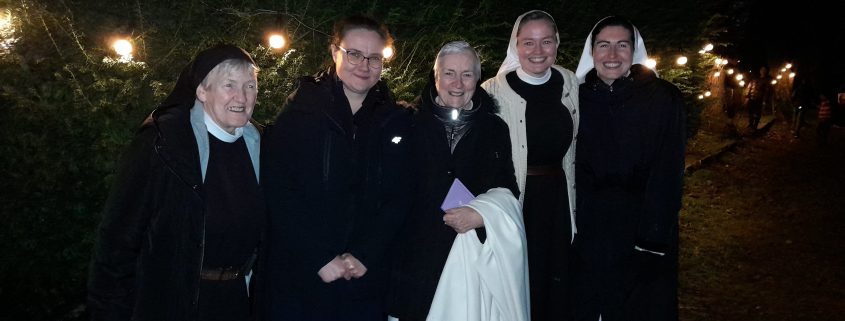Nine Lessons and Carols at Lismore Cathedral
Just before Christmas, our sisters in formation, together with Mother Marie and Sr Mairéad, novice director, attended Nine Lessons and Carols at the Church of Ireland Cathedral in Lismore. One carol in particular gave rise to a reflection for one of our young Sisters. She writes:
The hymn See Him Lying on a Bed of Straw, describing the simplicity of the Lord’s birthplace, may not be widely known for its theological depth—perhaps due to its jaunty melody! Yet, upon closer reflection, its lyrics are a profoundly moving account of the life and mission of Christ.
The last verse in particular, resonates with the heart of our Religious vocation:
“Mine are riches from your poverty,
from your innocence, eternity.
Mine, forgiveness by your death for me,
Child of sorrow for my joy.”
These lines encapsulate both the paradox of the Incarnation and the Paschal Mystery: Christ, who embraced poverty, suffering, and death, offers humanity the riches of eternal life, forgiveness, and joy.
What this verse brought to mind was a letter I once read from the archives of the Sisters of Mercy, penned in the late 1800s. It eloquently captures the motivation and essence of a call to Religious life:
“There are some hearts to whom He has given higher, deeper yearnings which the world knows not of, and which it cannot understand; some hearts who cannot live in luxury, when our Lord lived in poverty; who cannot be idle, when He went about doing good… when He told us that in ministering to them, we minister unto Him.”
The hymn and letter both point to the radical nature of the Gospel, which invites us to participate in the mystery of Christ’s self-emptying love. In the quiet rhythm of Cistercian life, these truths are not simply meditated upon but lived. Poverty is not only material but also a stripping away of the false self; simplicity is not merely external but a way of perceiving the world in light of God’s presence.
As we gathered in prayer this Christmas, the words of the carol served as a quiet reminder that the Incarnation transforms even the most ordinary moments. The humility of Christ’s birth, lived out daily in our monastic life, invites us to be witnesses to a hidden yet enduring joy. This joy does not erase sorrow but redeems it, becoming a light that shines in the most unexpected places—like the stable of Bethlehem and, perhaps, within our own hearts.



